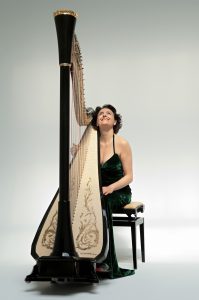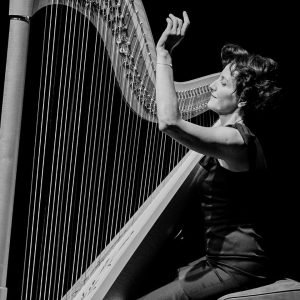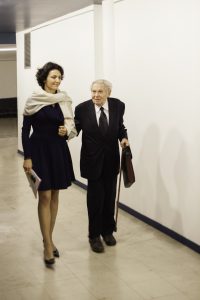Camac Blog
Talking with Isabelle Moretti
News
November 10, 2017
“For a composer, there is no more intense emotion than hear their work performed as they would dream to be able to play, themselves. I was overcome by this feeling when Isabelle Moretti premiered my harp concerto “Le Tombeau de Virgile” at the Théâtre des Champs Elysées. The piece seemed extraordinarily familiar to her: she played it from memory, with incredible security. Musically, it was as if it could not be any other way: such beautiful sound, such perfect style, so much depth and eloquence in her playing. It was on that evening that I knew that Isabelle Moretti is one of the greatest artists I have ever been privileged to meet.”
Philippe Hersant, composer
Isabelle Moretti needs little introduction to harpists today. After winning international competition prizes in Geneva, Munich and Israel at the start of her career, she is now one of the best-known classical soloists for our instrument. Read about her here.
In the run-up to her recital at the Camac Festival USA, you can also discover more in the interview below.
You are one of the most fêted soloists in the world. Can you tell us more about your career path, and how you got to where you are today?
Well, I worked hard. We can say that right at the start! After that – I was lucky to have an incredible teacher, Germaine Lorenzini. And a solid classical progression – conservatoire, international competitions, concert agents, and so on. You have to develop your talent of course, and then also you need some clever awareness of how to sell yourself, which is sometimes very far away from music. I personally have no vision of myself at all. I am who I am…I can’t picture myself as a well-known soloist, although I know I am one. This is more common than you’d think – a lot of soloists don’t really know how they got there. Par contre, there are agents who are masters of this, and that’s why they do what they do.
Regarding the competitions I did, I don’t come from a musical family, so I had to do competitions in order to broaden my musical perspectives, and to meet people. Everyone knows that the phone doesn’t start to ring just because of a competition win. What competitions really achieve, above all, are encounters. You meet fellow competitors, jury members, audience members, press, agents…and I was lucky to meet people who believed in me and took up my cause. The Munich (ARD) competition is a particularly important one because it offers concerts as prizes, also a lot of chamber music with other laureates. Never underestimate the importance of meeting people. The word “soloist” is a bit deceptive in that regard.
In an earlier interview (with Marta Glenszczyk of MyHarp), you said that you particularly like teaching, and that you would not enjoy your career as a soloist so much, if you weren’t also teaching alongside it. Can you tell us more about what teaching means for you, and how this influences your work as a concert artist?
I have loved teaching ever since I started doing it at the age of twenty-four. Firstly it’s really a relief and an important balance not to have to gaze at your own soul all the time, and think about someone else instead! And when you do go back to yourself, teaching obliges you to reexamine your persepectives all the time. That’s healthy, otherwise it’s easy to take yourself too seriously.
I also see it as another way to share what I experience and can transmit as a soloist. When you perform, you are sharing the music with the audience, and when you teach, you are sharing it with the student. This communication is fundamental for me.
You studied the harp with the late Germaine Lorenzini, who taught many famous harpists. What made her teaching so special?
There were two things. The first, which is rare in teachers, was that she really delved into the relationship between the instrument, and the body of the instrumentalist. She wasn’t satisfied by just doing what her teacher had told her to do, then passing that on to her students. She really thought about what possibilities each individual had, and what they didn’t. She tried to help her students to find a very harmonious relationship with their instrument, mechanically/technically speaking. Technique is a tool for communicating what you want to express, so the better your technique, the better it is for your music of course.
Secondly, she approached music – and life! – with complete integrity. She had done a lot of orchestra, her musical experience and vision was very sharp. And she was very generous and unbelievably human. She constantly gave of herself in order to help people. This was the “Cocktail Lorenzini” – it was completely unique.
You teach at the Paris Conservatoire. It’s probably the hardest school to get into in the world. What advice would you give to students who want to take up the challenge? How can you best prepare for the entrance auditions?
First thing: at the moment a student decides to prepare this competition, their free choice piece should be one they already know and have performed in public. This is because they have to focus on the set work in their available learning time. They should also practise sight-reading. Going back to the free choice: it’s not worth chasing an excessively difficult piece. It’s much better to choose a piece they can defend, and where they can express their personality.
Do you think there is a French Harp School? It’s a concept we hear a lot, but in reality it’s not well-defined.
It’s harder to define today – maybe because our communications are all faster, and the world is more global! So there are more different influences. I completely recognise and immensely respect our illustrious masters of the French harp, from Pierre Jamet to Marcel Tournier, together with Henriette Renié, Micheline Kahn and Marcel Grandjany. But I am still very inspired by wonderful harpists from all over the world!
I also think that what is important in a “school” today, it is the culture of the country. This is what is so enriching. In France, on a simplified level you could say for example that we like to argue, to refine, that we love freedom and…having enough time to live and to eat! It’s true that we have a culture of “beau son”, “beautiful sound”, which is something very polished. On the other hand, that could mean that we are not so spontaneous (although that doesn’t affect me, because I am lucky to have a lot of Italian blood in my veins!).
Beyond this, the role of every professor in the world is to give their students tools to serve music. As Germaine Lorenzini realised so well, it is much more important to establish a real harmony between yourself and your instrument, than it is to stick doggedly to this technique or the other one. Whatever school people call it!
You are also very known for your chamber music work, and you say you love to make music with friends. Why is friendship so important for you, in this context?
Yes – it may seem obvious, but it’s very simple: I have much more joy when I play with friends. I’m sorry to perhaps disappoint some readers, but I definitely prefer people to music! We serve music, but the point is that music, in its turn, is there to help us to communicate with each other on a higher spiritual level. What a gift!
It’s a very personal attitude. Lots of people probably also love playing chamber music with fantastic musicians who are not their friends. But for me, at the moment you play chamber music with friends, you have a change of energy. You work on the piece first, before rehearsing, and then you come together with the shared goal of succeeding in creating something fine. That comes from everyone’s hearts. And that connection is made by music. Such work always fills me with joy.
What advice would you give to harpists at the start of their career? We cannot all become soloists. How can we find our own path?
Practise a lot, while you still have the time to do so. You need to find yourself, in order to melt your voice with the composer’s one. It is like a beautiful dance, but freedom in music has a price, and this price is time. The market is tough and you have to be the best version of yourself. If you want to be a soloist, you need to know that the time behind the harp is forty percent of the work, and the rest is communication and marketing – which takes a lot of time. You need to be very robust, mentally and physically. There are lots of techniques that have been developed to help with this – sophrology, meditation…there are lots of options to centre yourself and keep focused and confident.
As for finding your path, everyone is trying to this all the time, musicians or no musicians! Maybe young people could learn about intuition a bit earlier. Those who are exceptional are not always those who follow the rules – although if you’re going to break them, you must build solid bases first! If you feel something strongly, you should go after that feeling. You must also never be afraid of making mistakes, which would be the worst possible condition for an artist. You have to be prepared to be wrong, to take risks. Following a path because you suppose you ought to or have to – this is unlikely to end well for a creative artist.
One of my favourite quotes is: “be yourself. Everyone else is already taken!”



